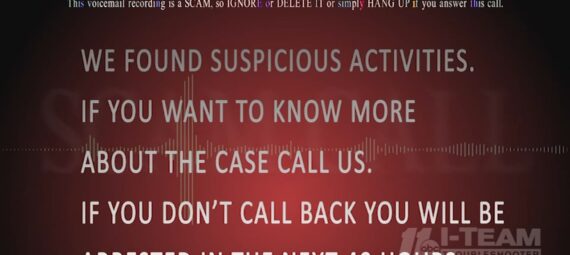The Arrest for Serious Charges Scam Alert
If someone calls you saying that you will be arrested by “local law enforcement” for “serious charges” unless you pay money, it is a scam.
The scammers may claim to be representatives of a government agency, a law enforcement agency, or a debt collector, and may threaten arrest if payment is not made immediately. This is a scam.
It’s amazing how many smart people fall for this.
So why is this a scam?
Due Process Protects You From Unknown Charges
The United States Constitution requires everyone to be notified if they have been charged with a crime. Generally speaking, this is called Due Process.
The Fifth Amendment
The Fifth Amendment to the United States Constitution protects individuals from being charged with a crime without knowing it through the Due Process Clause, which states that no person shall be “deprived of life, liberty, or property, without due process of law.”
This means that the government must follow certain procedures and provide certain safeguards when it charges an individual with a crime.
One of these safeguards is the requirement that an individual be informed of the charges against them. This is known as the “notice requirement,” and it is a fundamental aspect of due process.
Without proper notice, an individual cannot prepare a defense, challenge the charges, or otherwise assert their rights in a court of law.
Therefore, you’ll know you’ve been charged with a crime, and you don’t get a telephone recording.
The Fourth Amendment
Being arrested is a bit different than being charged, but you’ll still know why you’re being arrested.
Under the Fourth Amendment of the United States Constitution, individuals have the right to be informed of the reason for their arrest. This means that law enforcement officers must inform individuals of the charges against them before or at the time of their arrest.
Practically speaking, there is almost no chance that you’ll get arrested without knowing why.
Of course, there may be exceptional circumstances where an individual is taken into custody without being immediately informed of the specific charges.
For example, if a person is arrested during the commission of a crime, the police may need to detain them before they have a chance to fully understand the charges. In such cases, the individual should be informed of the charges against them as soon as practicable.
But you will never get a phone call from a recording saying you are about to be arrested.
When Police Will Call You in a Criminal Context
Detective Calls You
First, if you ever got a phone call from a detective or police officer, it would be a live call. He will tell you why he’s calling and inform you that he has a warrant for your arrest.
Yes, police do show up to defendants’ homes without calling in special circumstances, but in these cases, the defendants definitely know why they are there.
Nevertheless, you will never get a phone call saying you must pay money to make the arrest go away or not happen.
No Phone Call for Missed Court Date
If you’re already involved in a criminal case, and you have a court date, you must appear for that court date. If you don’t show up, a bench warrant could be issued for your arrest.
But even if you miss a court date and the judge issues a warrant for your arrest, nobody is going to call you. Law Enforcement agencies will be notified of the warrant, however, they are not going to actively look for you for a missed court date.
You will be arrested if you are randomly stopped by police. For example, you could be driving to dinner and a cop pulls you over for speeding. When they run your license, they will see you have a bench warrant, and arrest you.
But again, if you get arrested on a bench warrant, you will likely know why.
No Phone Call in Civil Law Context
First, it is very rare to be at risk of arrest in a non-criminal context.
If you are involved in a Civil Case such as a Divorce, Contract dispute, Property dispute, etc., your judge may order you to do something. If you ignore the judge, you could be held in contempt of court.
But, if you are held in contempt, you likely had multiple opportunities to prevent it from happening. Even then, the chances of you being arrested are extremely small.
But again, if you are, you will know why you’re being arrested.
How to Protect Yourself
It’s important to note that genuine government agencies and law enforcement agencies do not make threats of arrest over the phone to collect debt or payments. If you receive such a call, it is likely a scam, and you should not provide any personal or financial information over the phone.
If you are unsure if a call is a scam, you can take the following steps:
- Hang up: Do not engage in conversation with the caller. Simply hang up the phone.
- Verify the caller’s identity: If you are concerned that the call may be legitimate, you can try to verify the caller’s identity by searching for the phone number online or by calling the agency or law enforcement agency that the caller claims to represent.
- Report the scam: You can report the scam to the Federal Trade Commission (FTC) and your state attorney general’s office. This can help the authorities track and stop these types of scams.
Summary:
There is almost no chance that police are ever looking to arrest you and you don’t know anything about it.
And most importantly, you’ll never be asked over the phone to pay money to prevent being arrested.
If you have any questions, please leave them in the comments
Derron Woodfork
P.S. Please spread this article, and be aware of scams


